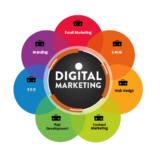Digital Marketing – what is it?
Digital marketing means communication, and not as many people think, technology. Its objective is to generate awareness, create engagement of the user, drive action and foster loyalty.
The well-known marketing 360°, where digital marketing was only one of the elements, evolved into marketing 720°, where digital marketing has its proper game of layers.
Marketing 360 is the marketing strategy where the company covers all possible touch points with the customer:
- Branding
- Direct marketing
- Media
- Advertising
- PR
- CRM
- Event
- Digital
Given that digital evolved significantly through the years, its scope covers following areas:
- Website
- Email marketing
- Online media
- Advertising
- Social media
- eCRM
- SEO/SEM
- Mobile
- E-commerce
The power of Digital Marketing: harnessing the potential of the online world
In today’s rapidly evolving digital landscape, businesses must embrace the power of marketing happening in internet to stay competitive and effectively engage with their target audience. With the widespread adoption of the internet and the proliferation of digital devices, the way people consume information and make purchasing decisions has dramatically changed. Digital marketing has emerged as a critical tool for businesses to reach their customers and drive growth. In this article, we will explore the importance of internet marketing and its various facets that make it an indispensable strategy for businesses of all sizes.
Digital marketing: enhanced targeting and personalization
One of the key advantages of digital marketing is its ability to target specific audiences with precision. Unlike traditional marketing channels, digital platforms provide valuable data and insights about customer behavior, demographics, and preferences. This wealth of information enables marketers to create highly targeted and personalized campaigns. By understanding their customers’ needs and desires, businesses can tailor their messages and offerings to resonate with their target audience, resulting in higher conversion rates and customer satisfaction.
Cost-effectiveness and higher ROI
Marketing in internet offers a cost-effective alternative to traditional marketing methods. For small and medium-sized businesses with limited budgets, digital channels level the playing field and allow them to compete with larger enterprises. Online advertising, social media marketing, and email campaigns can be executed at a fraction of the cost of traditional print, radio, or television advertisements. Moreover, digital marketing campaigns can be monitored and optimized in real-time, ensuring that businesses achieve a higher return on investment (ROI) by allocating their resources to the most effective strategies and channels.
Increased reach and global presence
The internet has no geographical boundaries, and digital marketing provides businesses with the opportunity to expand their reach far beyond their local markets. With the right strategies, businesses can target international audiences and establish a global presence. Social media platforms, search engine optimization (SEO), and content marketing enable businesses to engage with potential customers worldwide. This global reach opens up new markets, fosters brand awareness, and generates leads from diverse demographics and cultures.
Measurable and actionable insights
This type of marketing enables businesses to track and measure the effectiveness of their campaigns accurately. Analytics tools and platforms provide detailed insights into various metrics such as website traffic, click-through rates, conversions, and customer engagement. These data-driven insights allow businesses to make informed decisions, refine their marketing strategies, and optimize their campaigns for better results. The ability to track performance in real-time empowers marketers to adjust their tactics promptly, saving time and resources compared to traditional marketing methods that lack such immediacy.
Engagement and interactivity
Marketing in internet offers unique opportunities for businesses to engage and interact with their customers. Social media platforms, blogs, and online communities allow for two-way communication, where businesses can actively listen to their customers, address their concerns, and build relationships. This interactive nature of digital marketing fosters brand loyalty, enhances customer trust, and increases the likelihood of repeat purchases. By providing valuable and relevant content, businesses can position themselves as thought leaders and industry experts, further strengthening their brand reputation.
Digital marketing has revolutionized the way businesses promote their products and services, offering a plethora of benefits that traditional marketing methods cannot match. From enhanced targeting and personalization to global reach and cost-effectiveness, digital marketing has become an essential tool for businesses seeking growth and success in the digital age. By leveraging the power of digital platforms, businesses can establish meaningful connections with their target audience, drive conversions, and ultimately achieve their marketing objectives. In an ever-evolving online world, embracing digital marketing is no longer a choice but a necessity for businesses looking to thrive in the digital era.

